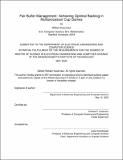Fair buffer management : achieving optimal backlog in multiprocessor cup games
Author(s)
Kuszmaul, William(William Henry)
Download1192483760-MIT.pdf (958.2Kb)
Other Contributors
Massachusetts Institute of Technology. Department of Electrical Engineering and Computer Science.
Advisor
Charles E. Leiserson.
Terms of use
Metadata
Show full item recordAbstract
The fair buffer management problem is a game on n cups. In each step, a filler distributes 1 unit of water among the cups, and then an emptier removes up to 1 + [epsilon] water from some cup. The emptier's goal is to minimize the water in the fullest cup (i.e., the backlog). We introduce a randomized algorithm (the smoothed greedy algorithm) that achieves backlog O(lg lg n) with high probability for 2[superscript polylog n] steps. The smoothed greedy algorithm can also be interpreted as a smoothed analysis for the deterministic greedy algorithm. The cup game also has a multi-processor analogue in which p units of water arrive per step (with no more than 1 unit arriving per cup) and then p cups are emptied out of by the emptier. Proving any nontrivial bounds on backlog for the multi-processor problem has remained an open problem for decades. We show that the greedy emptying algorithm achieves backlog (lg n), which is optimal for deterministic algorithms. We also show that the smoothed greedy algorithm achieves backlog O(lg p + lg lg n) with high probability. Moreover, as long as [mathematical expression], then constant backlog can be achieved with probability [mathematical expression]. We also consider stronger guarantees than bounds on backlog. We show that a variant of smoothed greedy achieves a bound of [mathematical expression] on tail size, which is the total number of cups that contain super-constant fills; we prove a matching lower bound of [mathematical expression]. Additionally, we consider whether randomized emptying algorithms can be made effective against non-oblivious fillers. Although fully adaptive fillers can thwart any randomized emptying algorithm, we show that if a small amount of information is kept from the ller (i.e., the lls of cups containing less than 3), then randomized emptying algorithms can be made eective. Finally, we apply the above techniques to eliminating ushing cascades from write-optimized external-memory search trees.
Description
Thesis: S.M., Massachusetts Institute of Technology, Department of Electrical Engineering and Computer Science, May, 2020 Cataloged from the official PDF of thesis. Includes bibliographical references (pages 155-160).
Date issued
2020Department
Massachusetts Institute of Technology. Department of Electrical Engineering and Computer SciencePublisher
Massachusetts Institute of Technology
Keywords
Electrical Engineering and Computer Science.